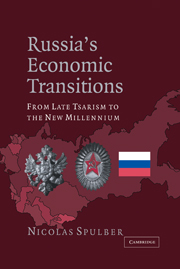Book contents
- Frontmatter
- Contents
- Figures and Tables
- Preface
- PART I THE TSARIST ECONOMIC TRANSITION
- 1 The Socioeconomic Framework
- 2 The Transition Issues
- 3 The Economic Policies
- 4 The Problems of Agriculture
- 5 The Industrial Changes
- 6 Domestic and Foreign Trade
- 7 Money and Banking
- 8 State Finance
- 9 Overall View
- PART II THE SOVIET ECONOMIC TRANSITION
- PART III THE POST-SOVIET ECONOMIC TRANSITION
- Index
7 - Money and Banking
Published online by Cambridge University Press: 03 December 2009
- Frontmatter
- Contents
- Figures and Tables
- Preface
- PART I THE TSARIST ECONOMIC TRANSITION
- 1 The Socioeconomic Framework
- 2 The Transition Issues
- 3 The Economic Policies
- 4 The Problems of Agriculture
- 5 The Industrial Changes
- 6 Domestic and Foreign Trade
- 7 Money and Banking
- 8 State Finance
- 9 Overall View
- PART II THE SOVIET ECONOMIC TRANSITION
- PART III THE POST-SOVIET ECONOMIC TRANSITION
- Index
Summary
The Monetary System
For comprehension of the Russian monetary system prevailing after the Crimean War, a brief recap of its origins and evolution may prove helpful. The basic features of this system were established under Peter the Great. At the time, the state issued gold rubles, silver rubles (at the exchange rate of 13.8 silver rubles to 1 gold ruble), and small copper change. By 1755, under the Empress Elizabeth, the state issued a new set of gold pieces – so-called imperials and semi-imperials – at a high rate of exchange against the silver rubles. Finally, under Catherine II in 1759, paper money made its appearance under the name of assignat rubles. The price of the assignat was set almost equal to that of the silver currency. The number of assignats increased sharply afterward, particularly during the war with Napoleon, and their value declined appreciably. By 1810, under Alexander I, Russia finally decided to reduce the amount of paper rubles in circulation, increase their value, and ensure the country's monetary stability. To do so, the state adopted as a monetary basis silver monometallism, that is, it made the silver ruble the country's basic monetary unit. At the time, it had also been projected to give to the assignant a precise value in relation to silver, but the project was not carried out.
The metallic money and the assignants continued to circulate jointly but at a high premium of exchange for the silver ruble.
- Type
- Chapter
- Information
- Russia's Economic TransitionsFrom Late Tsarism to the New Millennium, pp. 112 - 125Publisher: Cambridge University PressPrint publication year: 2003



